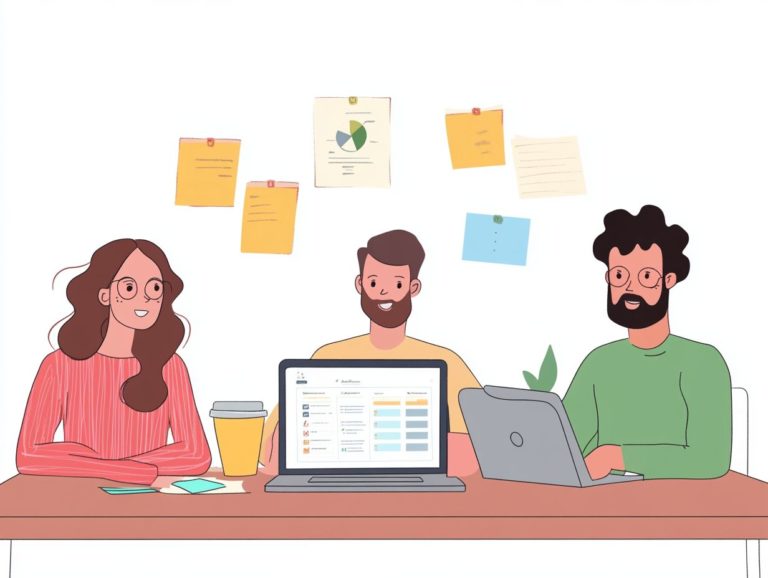Common Misconceptions About CRM Software
In today s fast-paced business landscape, it s easy to see why Customer Relationship Management (CRM) software might be misunderstood.
Many entrepreneurs and small business owners often assume that CRM is reserved for large corporations, believing it s prohibitively expensive or too complex to implement. Others may view it merely as a sales tool or think it requires a hefty one-time investment.
Keep reading to discover the truth behind these myths and see how CRM can transform your business!
This article seeks to debunk those misconceptions, shedding light on the true versatility and affordability of CRM software. Whether you re running a small business or part of a larger team, grasping the value of CRM can revolutionize your operations and elevate customer relationships.
Contents
- Key Takeaways:
- Misconception #1: CRM Software is Only for Large Businesses
- Misconception #2: CRM Software is Expensive
- Misconception #3: CRM Software is Complicated to Use
- Misconception #4: CRM Software is Only for Sales and Marketing
- Misconception #5: CRM Software is a One-Time Solution
- Frequently Asked Questions
- What are some common misconceptions about CRM software?
- Is CRM software only beneficial for sales teams?
- Do I need to have a lot of technical knowledge to use CRM software?
- Can CRM software only be used for customer management?
- Will using CRM software make my job obsolete?
- Is investing in CRM software worth the cost?
Key Takeaways:

CRM software is not just for large businesses. It can also be beneficial for small and medium-sized businesses.
There are affordable options for CRM software, making it easy for businesses of all sizes to access.
CRM software is designed with user-friendly features, making it easy to navigate and use.
What is CRM Software?
Customer Relationship Management (CRM) software is key for improving your customer experience by streamlining processes and enabling your teams to manage and analyze customer interactions effectively.
This technology empowers businesses of all sizes to tailor strategies based on unique customer needs, ultimately improving relationships and driving sales.
Using automation helps you streamline your processes, minimize manual errors, and reclaim precious time to focus on what truly counts: nurturing robust relationships with your customers.
By integrating various functionalities such as data security and user experience, CRM solutions allow you to track valuable information, enhance collaboration, and make informed decisions that lead to better investment returns.
CRM software is not just about managing contacts; it boasts many features, including lead management, reporting, and customer segmentation. This enables you to craft personalized marketing efforts that truly resonate with diverse audiences.
For small businesses, leveraging these integrated solutions can level the playing field against larger competitors, providing insights that refine your sales pitch and customer engagement strategies.
On the flip side, larger enterprises gain from advanced analytics and scalable operations that promote cross-departmental collaboration and ensure a consistent user experience.
Thus, the significance of CRM transcends mere customer tracking; it is essential for cultivating long-term loyalty and driving sustainable business growth.
Misconception #1: CRM Software is Only for Large Businesses
One prevalent misconception about CRM software is the belief that it’s solely intended for large corporations. This misunderstanding causes small and medium-sized businesses to miss out on valuable CRM benefits.
By falling for this myth, they miss out on tailored CRM solutions designed to meet their unique needs and significantly enhance their customer relationships.
Debunking the Myth
Debunking the myth that CRM software is solely the domain of large businesses unveils a treasure trove of opportunities for smaller enterprises to elevate their customer success through customized solutions designed to meet specific needs.
The right CRM tools boast intuitive interfaces, making it easy for everyone on your team to adapt and harness powerful functionalities. This software not only tracks customer interactions but also dives into data analysis to provide actionable insights, enabling you to refine your strategies with precision.
As a result, organizations of any size can craft a more personalized experience, fostering increased satisfaction and loyalty, and fundamentally transforming how they engage with their client base.
Misconception #2: CRM Software is Expensive

One common misconception about CRM software is the belief that it comes with a prohibitive price tag, causing many businesses to shy away from this strategic investment.
In truth, there is a wealth of affordable options that cater to various business needs and budgets, ensuring that CRM solutions are accessible to everyone.
Don t let price scare you off! Explore affordable CRM solutions that fit your budget.
Exploring Affordable Options
Exploring affordable CRM software options reveals a treasure trove of solutions that offer robust features without sacrificing user experience or efficiency.
Among these, tools like HubSpot CRM and Zoho CRM truly shine, thanks to their scalable pricing and user-friendly interfaces.
HubSpot is often lauded for its seamless integration with marketing tools, making it a go-to choice for small businesses eager to enhance their outreach without breaking the bank.
On the other hand, Zoho CRM provides a comprehensive suite of features, including automation and analytics that can help streamline processes and boost productivity.
Both platforms prioritize affordability and ensure high levels of efficiency, serving as invaluable assets for organizations looking to maximize their resources while effectively managing customer relationships.
Misconception #3: CRM Software is Complicated to Use
Many believe CRM software is too complex to use, which may discourage businesses from integrating these invaluable tools into their operations.
However, many CRM solutions are designed with user-friendly features at their core, making it easy for teams to start using them.
Embracing these solutions can significantly enhance your operational efficiency and drive positive results.
User-Friendly Features
User-friendly features in CRM software are crucial for enhancing productivity and ensuring your teams can seamlessly adapt to new technology without being bogged down by overwhelming complexity.
These features typically include intuitive dashboards that offer a clear overview of key metrics, allowing you to make informed decisions at a glance.
Advanced reporting tools enable detailed analysis of sales trends and customer interactions, providing insights that can significantly enhance your strategic initiatives.
Automation capabilities streamline repetitive tasks, freeing up your valuable time and minimizing the chances of human error.
Such functionalities not only promote a smoother workflow but also empower your teams to concentrate on more strategic priorities. This ultimately cultivates a more productive environment.
Misconception #4: CRM Software is Only for Sales and Marketing

Thinking CRM is a one-time fix? That could be a huge mistake for your business! The idea that CRM software is only advantageous for sales and marketing teams truly undermines its value across multiple departments including customer service, support, and management.
Embracing CRM elevates collaboration and efficiency, enhancing the overall experience for both your team and your customers.
Other Departments that Benefit from CRM Software
Various departments, including customer service and support, can greatly enhance their operations by leveraging the capabilities of CRM software.
With features such as automated ticketing systems that automatically track customer requests and integrated communication tools, CRM platforms enable seamless interaction between teams.
This ensures that customer queries are addressed without delay. The analytics tools embedded within these systems offer invaluable insights into customer behavior, giving you the power to tailor your outreach and cultivate stronger relationships.
Your sales teams can make the most of lead tracking features for more focused marketing efforts, while project management tools help streamline workflows across departments, fostering a cohesive work environment.
By effectively leveraging these diverse applications, you enhance productivity and pave the way for higher customer satisfaction and loyalty.
Misconception #5: CRM Software is a One-Time Solution
The belief that CRM software is a one-time solution can create a pitfall for your business. This misconception may result in insufficient maintenance and missed opportunities for growth.
Embracing effective CRM means recognizing the necessity for ongoing updates and strategic implementation, ensuring that your system evolves and supports your continued success.
Act now to enhance your productivity and satisfaction levels!
The Importance of Ongoing Maintenance and Updates
Ongoing maintenance and regular updates are essential for your CRM software. They help ensure efficiency and a seamless user experience. This adaptability allows your business to respond effectively to changing market demands.
Implementing the latest features is just the beginning; you must also include user feedback in the design and functionality of the system. By actively seeking insights from your users, you can customize your CRM solutions to better align with the specific needs of your teams.
As business environments evolve, your software should be flexible enough to accommodate new processes or customer interactions. Continuous adaptation fosters improvement. It positions your business to quickly tackle challenges and seize new opportunities.
Frequently Asked Questions

What are some common misconceptions about CRM software?
Some common misconceptions about CRM software include the belief that it is only useful for large companies, that it is too complicated to use, and that it is only beneficial for sales teams. Understanding the limitations of CRM software can help clarify these misunderstandings.
Is CRM software only beneficial for sales teams?
No, CRM software can benefit various departments and roles within a company, including marketing, customer service, and management. It can help streamline processes and improve communication throughout the organization.
Do I need to have a lot of technical knowledge to use CRM software?
While some technical knowledge may be helpful, most CRM software is designed to be user-friendly and can be easily learned by anyone. Many providers also offer training and support to help users navigate the software.
Can CRM software only be used for customer management?
While the primary purpose of CRM software is to manage customer relationships, it can also be used for other purposes such as project management, lead generation, and data analysis. Some advanced CRM systems also offer customizable features to cater to specific business needs.
Will using CRM software make my job obsolete?
No, CRM software is meant to enhance and improve job functions, not replace them. It can automate repetitive tasks, freeing up time for employees to focus on more important tasks and improving their overall productivity.
Is investing in CRM software worth the cost?
Yes! Investing in CRM software can pay off greatly for businesses. It can help increase efficiency, improve customer satisfaction, and ultimately lead to higher sales and revenue. Many CRM software providers offer affordable pricing plans to fit different business budgets.






